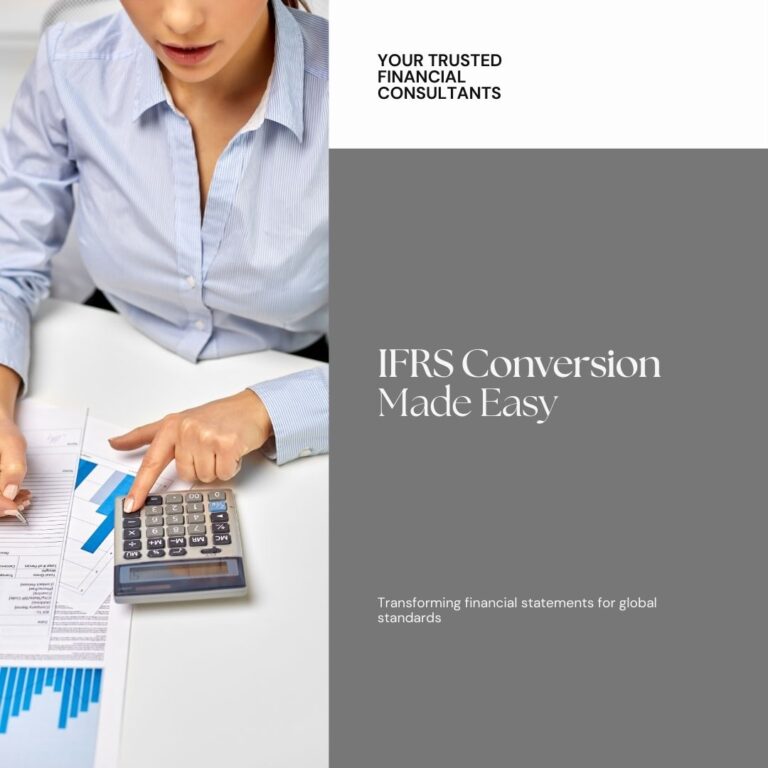Conversion of Financial Statements to IFRS/Ind AS
The Indian Accounting Standards (Ind AS) are structured in alignment with International Financial Reporting Standards (IFRS). The naming and numbering of Ind AS follow the same format as IFRS, ensuring consistency with global accounting practices.
Compliance with Ind AS is mandatory for certain companies in India that exceed a specified financial threshold. As a result, companies falling within this category must implement Ind AS for the presentation and disclosure of their financial statements. These standards have introduced significant changes in financial reporting, particularly in the recognition of income and expenses as well as the treatment of various items in the balance sheet.

Methodology for Conversion to IFRS/Ind AS by KMG CO LLP (CONVERSION OF FINANCIALS STATEMENTS TO IND-AS / IFRS)
KMG CO LLP follows a structured approach for converting financial statements to IFRS/Ind AS, ensuring compliance and accuracy. The key steps include:
Initial Assessment:
Conducting a detailed evaluation to identify the accounting standards that will impact financial statements.
Comparing existing accounting standards with Ind AS to determine differences in recognition, measurement, disclosure, and classification.
Implementation Support:
Providing guidance and assistance in addressing accounting differences during the transition.
Ensuring smooth adoption of Ind AS-compliant accounting policies and practices.
Preparation of IFRS/Ind AS-Compliant Financial Statements:
Developing fully compliant financial statements as per Ind AS/IFRS.
Ensuring adherence to all presentation and disclosure requirements.

Key Methodology for Conversion to IFRS/Ind AS
KMG CO LLP adopts a systematic approach to ensure a seamless transition to Ind AS/IFRS. The methodology includes:
Comparative Impact Assessment:
Conducting a detailed analysis of key Ind AS adjustments on the restated balance sheet and income statement at the conversion date.
Presenting a comparative assessment to evaluate the financial impact of transitioning from existing accounting standards to Ind AS.
Training & First-Time Financial Statement Preparation:
Providing training sessions for company staff to ensure a smooth understanding and adoption of Ind AS.
Assisting in the preparation of the first set of IFRS/Ind AS-compliant financial statements.
Financial Statement Consolidation:
Consolidating financial statements under multiple frameworks, including I-GAAP, Ind AS, and IFRS, ensuring compliance with regulatory requirements.

Initial Assessment:
Conducting a detailed evaluation to identify the accounting standards that will impact financial statements.
Comparing existing accounting standards with Ind AS to determine differences in recognition, measurement, disclosure, and classification.
Implementation Support:
Providing guidance and assistance in addressing accounting differences during the transition.
Ensuring smooth adoption of Ind AS-compliant accounting policies and practices.
Preparation of IFRS/Ind AS-Compliant Financial Statements:
Developing fully compliant financial statements as per Ind AS/IFRS.
Ensuring adherence to all presentation and disclosure requirements.
Comparative Impact Assessment:
Conducting a detailed analysis of key Ind AS adjustments on the restated balance sheet and income statement at the conversion date.
Presenting a comparative assessment to evaluate the financial impact of transitioning from existing accounting standards to Ind AS.
Training & First-Time Financial Statement Preparation:
Providing training sessions for company staff to ensure a smooth understanding and adoption of Ind AS.
Assisting in the preparation of the first set of IFRS/Ind AS-compliant financial statements.
Financial Statement Consolidation:
Consolidating financial statements under multiple frameworks, including I-GAAP, Ind AS, and IFRS, ensuring compliance with regulatory requirements.

